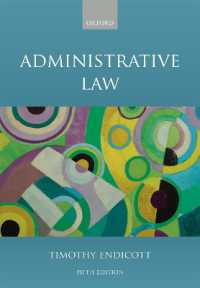- ホーム
- > 洋書
- > 英文書
- > History / World
Full Description
Emotions are as old as humankind. But what do we know about them and what importance do we assign to them? Emotional Lexicons is the first cultural history of terms of emotion found in German, French, and English language encyclopaedias since the late seventeenth century. Insofar as these reference works formulated normative concepts, they documented shifts in the way the educated middle classes were taught to conceptualise emotion by a literary medium targeted specifically to them. As well as providing a record of changing language use (and the surrounding debates), many encyclopaedia articles went further than simply providing basic knowledge; they also presented a moral vision to their readers and guidelines for behaviour. Implicitly or explicitly, they participated in fundamental discussions on human nature: Are emotions in the mind or in the body? Can we "read" another person's feelings in their face? Do animals have feelings? Are men less emotional than women? Are there differences between the emotions of children and adults? Can emotions be "civilised"? Can they make us sick? Do groups feel together? Do our emotions connect us with others or create distance? The answers to these questions are historically contingent, showing that emotional knowledge was and still is closely linked to the social, cultural, and political structures of modern societies.
Emotional Lexicons analyses European discourses in science, as well as in broader society, about affects, passions, sentiments, and emotions. It does not presume to refine our understanding of what emotions actually are, but rather to present the spectrum of knowledge about emotion embodied in concepts whose meanings shift through time, in order to enrich our own concept of emotion and to lend nuances to the interdisciplinary conversation about them.
Contents
1. Defining Emotions: Concepts and Debates over Three Centuries ; 2. Topographies of Emotion ; 3. Showing Emotions, Reading Emotions ; 4. The 'Origin' of Emotions - Sensitive Humans, Sensitive Animals ; 5. Healing Emotions ; 6. Age(ing) with Feeling ; 7. Felt Distances ; 8. Social Emotions ; 9. Civility and Barbarism: Emotions as Criteria of Difference ; 10. Emotional Knowledge - Modern Developments







